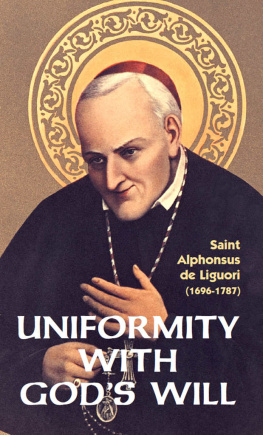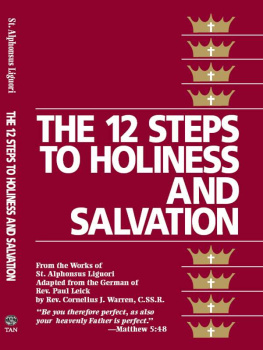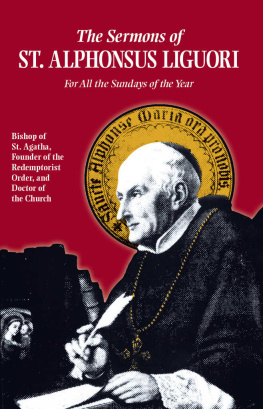St. Alphonsus Liguori - Uniformity with Gods Will
Here you can read online St. Alphonsus Liguori - Uniformity with Gods Will full text of the book (entire story) in english for free. Download pdf and epub, get meaning, cover and reviews about this ebook. year: 2015, publisher: TAN Books, genre: Religion. Description of the work, (preface) as well as reviews are available. Best literature library LitArk.com created for fans of good reading and offers a wide selection of genres:
Romance novel
Science fiction
Adventure
Detective
Science
History
Home and family
Prose
Art
Politics
Computer
Non-fiction
Religion
Business
Children
Humor
Choose a favorite category and find really read worthwhile books. Enjoy immersion in the world of imagination, feel the emotions of the characters or learn something new for yourself, make an fascinating discovery.
- Book:Uniformity with Gods Will
- Author:
- Publisher:TAN Books
- Genre:
- Year:2015
- Rating:5 / 5
- Favourites:Add to favourites
- Your mark:
- 100
- 1
- 2
- 3
- 4
- 5
Uniformity with Gods Will: summary, description and annotation
We offer to read an annotation, description, summary or preface (depends on what the author of the book "Uniformity with Gods Will" wrote himself). If you haven't found the necessary information about the book — write in the comments, we will try to find it.
Uniformity with Gods Will — read online for free the complete book (whole text) full work
Below is the text of the book, divided by pages. System saving the place of the last page read, allows you to conveniently read the book "Uniformity with Gods Will" online for free, without having to search again every time where you left off. Put a bookmark, and you can go to the page where you finished reading at any time.
Font size:
Interval:
Bookmark:
Uniformity
with
Gods Will
St. Alphonsus de Liguori
| Imprimi Potest: | John J. Sephton, C.SS.R. |
| Provincial | |
| Nov. 21, 1951 | |
| Nihil Obstat: | John J. Walsh, S.J. |
| Diocesan Censor | |
| Imprimatur: | Richard J. Cushing |
| Archbishop of Boston | |
| January 5, 1952 |
The Nihil Obstat and the Imprimatur are ecclesiastical declarations that a publication is free of doctrinal or moral error, not a statement of the positive worth, nor an implication that the contents have the Archbishops approval or recommendation.
TAN Books
Charlotte, North Carolina
www.TANBooks.com
2013
CONTENTS
PREFACE
In Volume 1, Opere Ascetiche di S. Alfonso M. de Liguori, Roma, 1933, Uniformity with Gods Will is included as one of three works under the heading, Lesser Works on Divine Love. There is no preface in the Italian original. However, it has been thought well to provide one here.
Prof. Candido M. Romano says this brochure was written probably in 1755, as appears from a letter by the Saint, under date of Nov. 2, 1755, to Sister Giannastasio, at Cava. Romano goes on to say:
This (i.e. Gods will) was for Alphonsus a theme of predilection, a theme dearest to his heart. Just as St. Ignatius stressed the greater glory of God, St. Alphonsus in all his works, gave prominence to the greater good pleasure of God. Most likely the occasion that brought forth this treatise was the death, in 1753, of Father Paul Cafaro, C.SS.R., St. Alphonsus confessor and director. The death of this worthy priest deeply affected the Saint and he expressed his sentiments in a poem on Gods will. The wide acclaim it received may have suggested to him the thought that a tract on the same subject would be helpful to the souls of others. If this be true, his surmise proved correct, for the appearance of his subsequent pamphlet was greeted with instant favor.Cardinal Villecourt, in his Life of St. Alphonsus, quotes long passages from this pamphlet and ends by saying: Our Saint frequently read it himself and when his sight had failed he arranged to have it read to him by others.
This brochure bears the stamp of Alphonsian simplicity of style and solidity of doctrine. Moreover the instances he cites from the lives of the saints have a gentle graciousness and contain a fragrance that is redolent of the Fioretti of St. Francis of Assisi.
Through Gods grace and our Ladys prayers may a diligent reading of the book bring us far along the way of perfection by the cultivation of uniformity with Gods holy will!
Thomas W. Tobin, C.SS.R.
Oct. 16, 1951. Feast of St. Gerard Majella, C.SS.R.
UNIFORMITY WITH GODS WILL
Excellence of this Virtue.
Perfection is founded entirely on the love of God: Charity is the bond of perfection; ( Col . 3:14) and perfect love of God means the complete union of our will with Gods: The principal effect of love is so to unite the wills of those who love each other as to make them will the same things. It follows then, that the more one unites his will with the divine will, the greater will be his love of God. Mortification, meditation, receiving Holy Communion, acts of fraternal charity are all certainly pleasing to Godbut only when they are in accordance with his will. When they do not accord with Gods will, he not only finds no pleasure in them, but he even rejects them utterly and punishes them.
To illustrate:A man has two servants. One works unremittingly all day longbut according to his own devices; the other, conceivably, works less, but he does do what he is told. This latter of course is going to find favor in the eyes of his master; the other will not. Now, in applying this example, we may ask: Why should we perform actions for Gods glory if they are not going to be acceptable to him? God does not want sacrifices, the prophet Samuel told King Saul, but he does want obedience to his will: Doth the Lord desire holocausts and victims, and not rather that the voice of the Lord should be obeyed? For obedience is better than sacrifices; and to hearken, rather than to offer the fat of rams. Because it is like the sin of witchcraft to rebel; and like the crime of idolatry to refuse to obey. ( 1 Kgs . 15:22, 23). The man who follows his own will independently of Gods, is guilty of a kind of idolatry. Instead of adoring Gods will, he, in a certain sense, adores his own.
The greatest glory we can give to God is to do his will in everything. Our Redeemer came on earth to glorify his heavenly Father and to teach us by his example how to do the same. St. Paul represents him saying to his eternal Father: Sacrifice and oblation thou wouldst not: But a body thou hast fitted to me... Then said I: Behold I come to do thy will, O God. ( Hab . 10:5-7). Thou hast refused the victims offered thee by man; thou dost will that I sacrifice my body to thee. Behold me ready to do thy will.
Our Lord frequently declared that he had come on earth not to do his own will, but solely that of his Father: I came down from heaven, not to do my own will, but the will of him that sent me. ( John 6:38). He spoke in the same strain in the garden when he went forth to meet his enemies who had come to seize him and to lead him to death: But that the world may know that I love the Father: and as the Father hath given me commandment, so do I; arise and let us go hence. ( John 14:31). Furthermore, he said he would recognize as his brother, him who would do his will: Whosoever shall do the will of my Father who is in heaven, he is my brother. ( Matt . 12:50).
To do Gods willthis was the goal upon which the saints constantly fixed their gaze. They were fully persuaded that in this consists the entire perfection of the soul. Blessed Henry Suso used to say: It is not Gods will that we should abound in spiritual delights, but that in all things we should submit to his holy will.
During our sojourn in this world, we should learn from the saints now in Heaven, how to love God. The pure and perfect love of God they enjoy there, consists in uniting themselves perfectly to his will. It would be the greatest delight of the seraphs to pile up sand on the seashore or to pull weeds in a garden for all eternity, if they found out such was Gods will. Our Lord himself teaches us to ask to do the will of God on earth as the saints do it in Heaven: Thy will be done on earth as it is in heaven. ( Matt . 6:10).
Because David fulfilled all his wishes, God called him a man after his own heart: I have found David... a man according to my own heart, who shall do all my wills. ( Acts 13:22). David was always ready to embrace the divine will, as he frequently protested: My heart is ready, O God, my heart is ready. ( Ps . 56:8). He asked God for one thing aloneto teach him to do his will: Teach me to do thy will. ( Ps . 142:10).
A single act of uniformity with the divine will suffices to make a saint. Behold while Saul was persecuting the Church, God enlightened him and converted him. What does Saul do? What does he say? Nothing else but to offer himself to do Gods will: Lord, what wilt thou have me to do? ( Acts 13:22). In return the Lord calls him a vessel of election and an apostle of the gentiles: This man is to me a vessel of election, to carry my name before the gentiles. We cannot offer God anything more pleasing than to say: Take us, Lord, we give thee our entire will. Only let us know thy will and we will carry it out.
If we would completely rejoice the heart of God, let us strive in all things to conform ourselves to his divine will. Let us not only strive to conform ourselves, but also to unite ourselves to whatever dispositions God makes of us. Conformity signifies that we join our wills to the will of God. Uniformity means moreit means that we make one will of Gods will and ours, so that we will only what God wills; that Gods will alone, is our will. This is the summit of perfection and to it we should always aspire; this should be the goal of all our works, desires, meditations and prayers. To this end we should always invoke the aid of our holy patrons, our guardian angels, and above all, of our mother Mary, the most perfect of all the saints because she most perfectly embraced the divine will.
Next pageFont size:
Interval:
Bookmark:
Similar books «Uniformity with Gods Will»
Look at similar books to Uniformity with Gods Will. We have selected literature similar in name and meaning in the hope of providing readers with more options to find new, interesting, not yet read works.
Discussion, reviews of the book Uniformity with Gods Will and just readers' own opinions. Leave your comments, write what you think about the work, its meaning or the main characters. Specify what exactly you liked and what you didn't like, and why you think so.




![St. Alphonsus Liguori - Visits to the Blessed Sacrament (with Supplemental Reading: Novena of Holy Communions) [Illustrated]](/uploads/posts/book/269658/thumbs/st-alphonsus-liguori-visits-to-the-blessed.jpg)





![Saint Alphonsus de Liguori - The Saint Alphonsus de Liguori Collection [30 Books]](/uploads/posts/book/134324/thumbs/saint-alphonsus-de-liguori-the-saint-alphonsus-de.jpg)